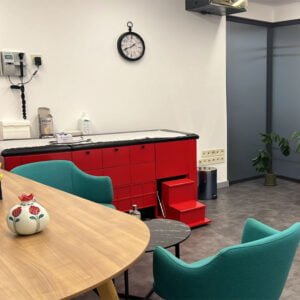This website uses cookies so that we can provide you with the best user experience possible. Cookie information is stored in your browser and performs functions such as recognising you when you return to our website and helping our team to understand which sections of the website you find most interesting and useful.
Local Anesthetic Drug Allergy Treatment
- Home
- Local Anesthetic Drug Allergy Treatment

All Inclusive Package Details
5 Star Accommodation
Transfer Services
Hospital
Expert Allergy Doctors
Why Should You Choose Us?
Founded in 2022, CURExplore is a service provider that brings together guests from abroad through medical staff and translators who can speak their own language.
CURExplore, which organizes international patients from all over the world, mostly from Europe to Turkey, is an Istanbul-based health tourism intermediary company that is a member of TURSAB (Association of Turkish Travel Agencies) with the code 14076 and has the Ministry of Health Accreditation.
30-minute free consultation.
After free online consultation, we determine your needs and plan your operation free of charge.
No Surprise Costs
We will not charge you any additional fees.
All Inclusive Packages
5-Star Accommodation, Transfer, Post-Operative Care at the Hotel, Translator, All Processes with You
Fill Out the Form and Get a Personalized Quote
Address
Küçükbakkalköy neighborhood. Merdivenköy Yolu neighborhood. No:12/1 Ataşehir / İstanbulContact Form
Frequently Asked Questions on Local Anesthetic Drug Allergy Treatment
An allergy to local anesthetic drugs is a condition where the body has an unexpected and excessive reaction to these drugs. Although these drugs, commonly used in surgical procedures or dental treatments, are safe for most people, they can occasionally cause allergic reactions in some individuals.
Allergy to local anesthetic drugs, though rare, can manifest with certain symptoms.
- Skin Reactions: After the application of the drug, you may notice redness, itching, or rashes on your skin.
- Swelling And Edema: Swelling and edema can occur in or around the area where the drug was applied.
- Breathing Difficulty: In more serious cases, this allergic reaction can affect your respiratory tract, making it difficult to breathe.
- Anaphylaxis: Very rarely, an allergic reaction called anaphylaxis, which can be life-threatening, may develop against local anesthetics. This situation requires immediate medical intervention.
- Rapid Pulse And Dizziness: During an allergic reaction, your heart rate may increase, and you may experience dizziness.
To diagnose this type of allergy, doctors usually perform skin tests and thoroughly examine your health history. If you suspect you have an allergy to local anesthetics, it is crucial to share this with your doctor before any surgical procedure or dental treatment.
If you are allergic to local anesthetic drugs, your doctor will likely opt for other types of anesthesia or local anesthetics with different chemical compositions. Especially before surgical interventions or dental treatments, mentioning any allergic reactions you have experienced in the past is key to minimizing potential risks. Although this type of allergy is rare, it is best to be prepared for possible situations.
To determine if you have an allergy to local anesthetics, your doctor will follow certain steps. This process is a bit like detective work, as your doctor will carefully examine both your past experiences and current symptoms. Initially, your doctor will ask about your and your family's allergy history. Any allergic reactions you have experienced in the past can provide important clues for your doctor.
If you have shown any reaction after local anesthetic, your doctor will want to know when these symptoms started, how long they lasted, and what effect they had. To determine if you have an allergy to local anesthetics, your doctor may perform skin tests. These tests involve applying small doses of allergens to your skin to observe how your skin reacts.
In some cases, blood tests may be done to check for the presence of antibodies that trigger allergic reactions. Your doctor may request a patch test. This test involves applying local anesthetics to your skin and monitoring your skin's reaction over several days.
Controlled provocation tests may be conducted. This can be a riskier method. Your doctor may apply very small doses of local anesthetic in a controlled environment to observe your body's response. Your allergy specialist will determine the most appropriate tests and follow-up path, considering your specific situation. As everyone's body reacts differently, it is important to find the most suitable approach with professional guidance.
Allergy to local anesthetics, although rare, can be a serious condition, and the correct approach is crucial. First, a diagnosis must be made. If you suspect you have had an allergic reaction to local anesthetics, your doctor will conduct various tests to confirm this condition. These tests are typically done on the skin or through blood analysis.
Allergies to local anesthetics usually develop against a specific component of the drug. Your doctor may conduct a detailed assessment to identify the substance causing the reaction. If your allergy is severe and shows life-threatening reactions, immediate medical intervention is required. This generally includes adrenaline injection and respiratory support. In some cases, a different type of anesthetic may be used instead of the allergenic anesthetic. For example, if you are allergic to amide-type anesthetics, your doctor may recommend an ester-type anesthetic.
To avoid similar problems in future treatments, it is important to avoid drugs that have caused allergic reactions and to record this information in your health records. If the situation is complex or unclear, consulting with an allergy specialist can be beneficial. The specialist can perform special tests to better understand your condition and suggest an appropriate treatment plan. Each patient is different, and thus each allergy case should be addressed according to the individual's unique circumstances. If there is a suspicion of allergy, it is always best to seek help from a health professional.



























